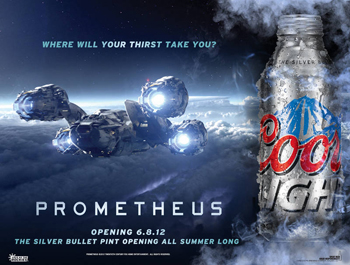20th Century Fox’s sci-fi yarn “Prometheus” lined up major tie-in partnerships with Coors, Verizon, and Amazon, according to Variety. The Coors alliance is the brewer’s first movie deal in six years. The R-rated sci-fi film from Ridley Scott (“Alien”, “Blade Runner” and “Gladiator”) will premiere June 8.

The Variety article by Marc Graser observes that R-rated films typically don’t snag promotional partners, which in the case of “Prometheus” provide $10 million to $30 million in marketing support from each partner.
“Amazon will push the pic across all of its websites, including its homepage and IMDB, through June 18. Company’s microsite for the film directs interested moviegoers to buy tix through Fandango,” says the Variety story.
Coors also gives the film signage on its new Silver Bullet Aluminum Pint bottle–which also becomes a cheap “collectable” for consumers. Verizon serves up a microsite website and VOD channel on its FiOS TV service.
Says a Coors press release, “A co-branded 30-second TV ad, produced by Scott and his production company RSA, debuts next week. The spot, titled ‘Do You Thirst?,’ features footage from the film and will air nationally on network prime-time, network and cable sports, and cable entertainment programming.” Zachary Eller, senior VP of marketing partnerships and promotions at 20th Century Fox, which arranged deals for the studio.
The advertising for “Prometheus” clearly and correctly position the futuristic big budget thriller as classy science fiction, which was Disney’s initial thrust with “John Carter” that was miscast and bombed. The first wave of “Carter” images were sinister looking and surreal with a heavy red-color wash (the film really was rollicking and over-the-top). Disney finally promoted “Carter” as a glossy spectacle, which was accurate and the maligned loss-making film then got some traction with audiences.
An Advertising Age story a few weeks ago pointed out leakage from international “Prometheus” trailers were undercutting the U.S. marketing campaign. The overseas trailers—which are longer—are more revealing and the U.S. campaign is more subtle putting a spotlight on slices of the movie. The Ad Age article by Shareen Pathak was on to something about a dichotomy, but any damage from the international leakage looks to be minor.
Related content:
Leave a Reply